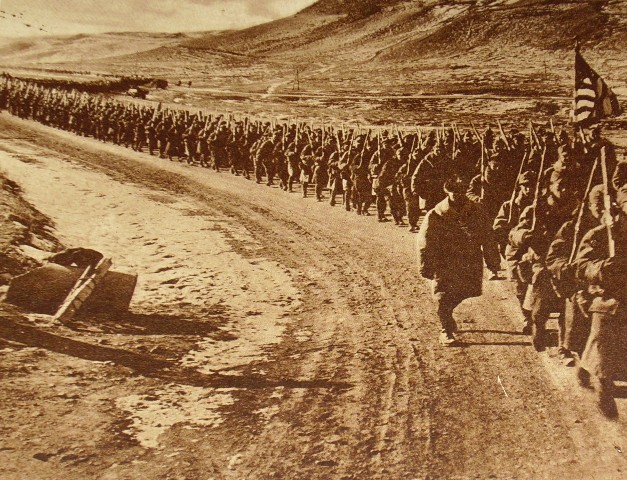Libby O’Connell: World War I legacy, ‘The peace to end all peace’
American troops on the march in France during World War I. (Wikimedia)
On April 6, America and many of its allies will solemnly commemorate the 100 year anniversary of the United States’ entry into World War I. The war had a lasting impact, both here and abroad, but even today people still wonder why we sent our Doughboys “Over There.” In an interview with Dr. Libby O’Connell, the Chief Historian Emeritus at The History Channel, we discussed a wide range of topics related to the vexing “War To End All Wars.” Dr. O’Connell was appointed by President Obama to serve on the US World War I Centennial Commission, where she oversees the Education Committee. She also serves as chairwoman of the World War I Centennial Committee for New York City.
BPE: Thank you for taking some time ahead of your trip to Paris to speak with us this evening.
Libby: Oh, well thank you for your interest.
BPE: Would you help set the stage for our readers by briefly telling us a bit about the primary causes of World War I? What was going on with Europe and her various colonies at that time?
Libby: World War I was a time where you had this clash of longstanding world powers. You had these dynasties which had been around and ruling for hundreds of years: the Romanovs, the Ottomans, and the Hapsburgs. On the other side, you had the British, which still had a king but had a constitutional government. You had France, which was a republic, and you had Belgium as well, but all of these countries were competing powers. Who would have the most colonies – particularly in Africa? Who would have the strongest army or the largest navy?

One way to balance out this power was to enter into defensive treaties. France, wanting to balance the strength of the German empire, made an alliance with Russia. The Germans made a treaty with the Austro-Hungarian Empire, and so forth. Meanwhile, small countries in the Balkans, which had been under the rule of the Ottoman Turks, were breaking free. So you had this rise of nationalism. One way to remember the origins of World War I is with the mnemonic: MANIA. That stands for
> M – militarism
> A – alliances
> N – nationalism
> I – imperialism
> A – assassination
The rise of all of these things created a tinderbox in Europe. There was a surge of nationalism, not only in the Balkans, where they wanted separation from the Ottomans and Austro-Hungarians, but in Ireland too. In the Middle East, the Arabs were waiting to break loose from the yoke of Turkish tyranny. All of these things were happening at the same time, so when you have the assassination of a Hapsburg – Archduke Ferdinand and his wife Sophie – by a very young Serbian man, who is a member of a secret society, it sets off a domino effect which ultimately plunges the world into war.
BPE: Many today wonder how the assassination of an obscure archduke led to such widespread carnage?
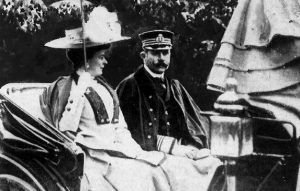
Libby: He may be obscure to us today, but he was an important heir in the Hapsburg family.
BPE: Would it be fair to say that Archduke Ferdinand was the equivalent to Prince Charles of England?
Libby: Yes. And I think that should help put things into perspective for the modern reader.
BPE: Given the history of the combatants and the various alliances in place at the time, was World War I avoidable?
Libby: It was avoidable if everyone would have just taken a step back. As one author of a recent book on the war has argued, everyone acted as if they were sleepwalkers. They were so set on the path to war, it was as if they kept stepping forward, and no one would back down. But calling them sleepwalkers doesn’t do justice to the energy with which they were walking to their fate. It would have been avoidable if they had stopped, but they didn’t. If Russia hadn’t begun to mobilize as quickly as they did, perhaps France and Britain wouldn’t have engaged in war with Germany when the Germans invaded Belgium. There are just so many “What ifs?”
Keep in mind that on top of the treaties, the various powers were living this 19th-century code of honor. Kaiser Wilhelm was guiding the Austrians in the ultimatum they delivered to Serbia, which basically said, “We’re going to take you over. You’ve killed our archduke; now you must give us control of your parliament.” Of course, the Serbs said no, so the Austrians invaded Serbia. It’s very complicated – there are so many players. Could somebody have turned this around? I’m not so sure.
BPE: There is the argument that the death of King Edward VII in 1910 was actually the event which set the world racing towards war.

Libby: Yes, there is that wonderful scene in Barbara Tuchman’s The Guns of August, where all of these heads of state come for King Edward’s funeral. They actually have more in common than one might think. They are peers on the world stage, and in many cases even cousins, but it all goes to hell rather quickly once the king is dead.
BPE: Once the war began, did the combatants miss any “golden” opportunities to end the fighting early? I know for instance there is the famous story of the Christmas truce, where opposing soldiers on the western front were playing soccer and singing carols together.
Libby: Yes – there are also stories about the Australians and Turks exchanging gifts at Gallipoli. But the officers on both sides told their men if they continued it, they would all be shot. It’s really appalling – the response to those moments of hope for peace.
BPE: That attitude in the ranks would eventually lead to the mutinies which happened at various times throughout the war?
Libby: Well, it was a war where the real strength and the heroism was with the soldiers and not their commanding officers. I don’t mean the lower level officers. I mean in the commanding staffs on all sides. These guys were out of touch with what was going on.
BPE: Could you briefly elaborate on that point and talk about the military and civilian leadership? Do any particular strengths or weaknesses come to mind?
Libby: It was sort of like the American Civil War, where you had this revolving door of generals before Lincoln settled on Grant. In Britain, you had Field Marshal Douglas Haig saying things like, “Well, each unit doesn’t need more than one machine gun.” He was more worried about horses than other means of transportation. This was the last war where you really see cavalry on a large scale, but by the end of the war, millions of horses had died. It wasn’t a great strategy.
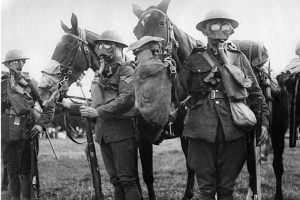
BPE: I guess the old adage that generals always fight the last war really applied here.
Libby: It’s really true, except that they didn’t learn from the American Civil War, where Robert E. Lee had invented modern trench warfare in defending Richmond. I always say that in World War I, the men rode in on horses and flew out on airplanes. Imagine that juxtaposition in technology.
BPE: What do we know about the morale of the soldiers in the field?
Libby: Morale was a real problem. Desertion was an issue on both sides, and it was met with the harshest repercussions. Men were shot for deserting, and often (under orders) by the very same comrades they had shared a trench with just a few hours before. This was incredibly hard on the men. Hunger was also an issue, and the French, in particular, depended on the food which was being shipped from America– not only for civilians but also the army.
There was also the weather, with the mud, and not making any progress while taking huge casualties. It was a depressing war to fight and frankly, a depressing war to study. Can you imagine both living in and fighting a war from those trenches?
BPE: Let’s talk about the trenches for a moment. Given the fact that you had the American Civil War as an example, why do you suppose military leaders on both sides of the line let their armies get bogged down in a protracted stalemate?
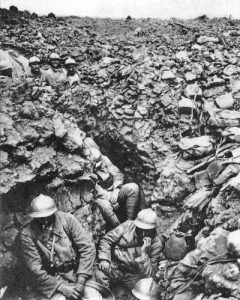
Libby: I don’t think that they envisioned that they would ever get bogged down. The Germans got so far so fast, and then they were stopped. Only then do you have the trench warfare where neither side could really move. The Germans never got to Paris. You could hear the bombing just north of the city. It’s amazing that life could go on while two armies were locked for so long in this static war. When the lines did move, it was back and forth and only a few hundred yards at a time. The land still bears the scars of those battles. People turning over the earth today to plant a garden are still digging up human bones along with unexploded ordnance.
BPE: Unexploded ordnance from World War I?
Libby: Yes. That still exists in the Ardennes forest, though of course people don’t know where it is buried. Near the end of the war, British saboteurs mined underneath the German field headquarters. The ensuing explosion could be felt all the way to London. They know that one of the stockpiles never did explode, so it’s sitting over there in France, somewhere underground.
BPE: While all of this was going on in Europe and other places around the world, what was happening here in the United States?
Libby: Well, Americans were watching the war with great interest. There was a very strong peace movement led in part by Jane Addams who was a very famous reformer. Then there were others, like Teddy Roosevelt, who wanted to go to war and thought we shouldn’t hesitate for one minute. And there were people who wanted to go before we finally declared war. Most joined the British or the French. The famous Lafayette Escadrille, for example. So, America is really divided. Plus, you have a large number of recent immigrants – a lot of them German and Irish – who really don’t want to go to war. Certainly, the Irish did not want to fight on the side of Britain, and the Germans didn’t want to fight against their brothers.
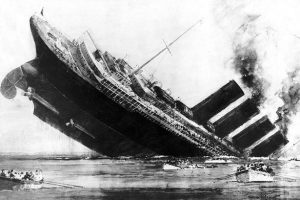
There were other things happening as well. The sinking of the Lusitania happened after the Germans had warned people not to travel and the Brits told passengers that they would be safe just the same. Wilson ran on the slogan, “He kept us out of war”, but the Zimmerman telegram, which outlined a proposed German/Mexican invasion of the continental U.S., was what put him over the edge.
BPE: Some believe that Woodrow Wilson – after winning reelection on a promise to keep us out of foreign wars – provoked war with Germany by playing up the Kaiser’s use of unrestricted submarine warfare. This, while simultaneously ignoring Britain’s unlawful starvation blockade and their mining of international waters. Is that a fair assessment?
Libby: People don’t know much about that blockade, even today. There was tremendous starvation in Germany, which continued for months after the war had ended. The Germans resorted to drafting young boys as a result, which of course they also did in World War II.
One thing about Wilson throwing in with the Allies: he was reticent to join them as long as Imperial Russia was in the picture. Remember, the Romanovs were allied with France and Britain, and Wilson saw them as a despotic monarchy. But once the Tsar was overthrown and the provisional government withdrew from the war, Wilson could justify his rhetoric that we were making the world, “Safe for Democracy”.
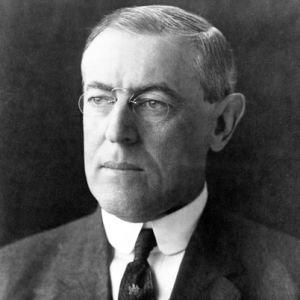
BPE: Didn’t we end up sending troops to Russia in 1918?
Libby: We did. That’s another untold story.
BPE: It seems that some of those troops even died on Russian soil – either in battle supporting the White Russians or because of the brutal weather conditions.
Libby: Or it may have been because of the flu. That’s normal, but when you get all of those people together in barracks and trenches, and they are already weakened from being in battle, you have a perfect storm. Men were sick in the ships coming home from the war, and that’s how some believe the west got the Spanish flu.
Most people don’t know that the reason it was called the Spanish flu is because Spain was neutral during the war. The Spanish newspapers were reporting that this virulent flu was occurring in Spain. It was happening elsewhere, of course, but no country at war wanted the enemy to know they too were dealing with this epidemic, so the story was not allowed in print. The flu may have actually originated here in America. The Smithsonian is doing some really interesting research on that.
BPE: What social changes happened stateside because of World War I? Did any of these changes have a bearing on the execution of the war?
Libby: One thing to know as a kind of umbrella way of looking at this question, is World War I changes everything in America. It has an impact on people from all walks of life, and the United States will never be the same.
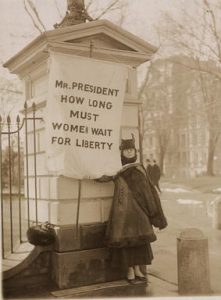
Some of these things had a long antecedent. Women had been struggling for the right to vote for almost eighty years. There were suffragettes protesting outside of the White House who were jailed as traitors by Wilson for demonstrating during a time of war. But even as this was happening, women were working in the munitions factories, in manufacturing, and on farms – doing the work of the four million men who had gone off to war. Congressmen who had previously been opposed to women’s suffrage were persuaded to change their vote due to the services rendered by all of these women during World War I.
Another thing which changed was the place of African-Americans in our society. World War I actually helped create the modern civil rights movement. Black soldiers who served in the American army were segregated, but those who fought in the French army were welcomed with open arms. The most famous group is the 369th, also known as the Harlem Hellfighters or the Black Rattlers. Many of them received the Croix de Guerre, and one (Sgt. Henry Johnson) was posthumously awarded the Medal of Honor by President Obama. But when they returned to the United States, they were treated terribly. Some in the South were lynched while still wearing their uniforms. As a result of this, many refused to go back to the South and that spurred the great migration of African-Americans into the North.
There was also technological change, including huge strides in radio and film. The government was helping to finance that development. It was an enormous benefit to the entertainment industry, but it would also later benefit the United States in World War II.
One more huge change was in the area of finance. At the beginning of the war, American lending institutions were lending money to both sides, but as the war progressed, they were lending primarily to the Allied nations. As a result, America went from being a debtor nation to a creditor nation and that made New York the financial capitol of the world.
Then, too, there was the progress in the aviation industry and advancements in medicine. Transfusions were born out of the need to care for wounded solders in the field. And there were advancements in the way bones were reset, which cut down on amputations.
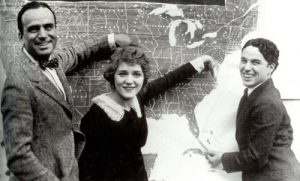
All of these were a direct result of the war.
BPE: While we’re on the subject of medicine, could we touch for a moment on mustard gas and other chemical weapons?
Libby: One of the impacts of gas that does not get counted when we talk about the mortality rate, is that men came home severely injured by poison gas in their lungs, but it did not kill them right away. They may have died ten years later of pneumonia or something like that, as a direct result of their weakened respiratory system.
BPE: We asked earlier about the morale of the soldiers in the field, but since you mentioned the entertainment business, what can you tell us about the morale of the people back home?
Libby: Well, you had the early Hollywood celebrities, silent movie stars like Douglas Fairbanks and Charlie Chaplin, crisscrossing the country to sell war bonds. They even took the Liberty Bell on tour! That’s another great story. America had never done that type of fund-raising before.
BPE: You’ve written a book (The America Plate) which uses food and drink as a lens for exploring the past. Please tell us what that lens says America in World War I.
Libby: One of the things I’m particularly interested in is the food relief we supplied during and after the war. That relief was successfully engineered by someone generally regarded by history as a failure: Herbert Hoover.
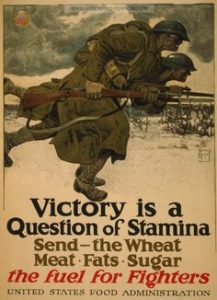
Hoover ran the food distribution program for Wilson, and he did an amazing job. He got Americans to volunteer for rationing – which was not mandated. There were ads in women’s magazines encouraging people to give up foodstuffs by having Meatless Mondays, Wheatless Wednesdays. Everyone was asked to grow their own Liberty Garden. Children raised crops in their school yards, just like we have edible school-yards today. People were also asked to reduce the amount of beef and sugar that they ate and opt instead for a fish and plant based diet. “Save the fat for the soldiers – they need more calories.”
People were concerned that they might get weaker because of this lack of calories in their diets, but what they discovered after the war is that Americans were actually healthier. It was a great surprise to them.
BPE: World War I dragged on for more than 4 years and cost millions of lives. But given the fact that we were at it again less than two decades later, is it fair to say the war actually ended too soon?
Libby: There are people who have argued that, had Germany won the first world war, we would never have had World War II. For one thing, there would have been no rise of Hitler. I’m not making that argument, but I can say this: The way we carved up the Middle East at the end of World War I is the reason we are having so much trouble there today. The same could be said about the Balkans. These countries we created around a table in Versailles led to an enormous number of hot-spots, and one hundred years later, they remain extremely volatile.
It was not the war to end all wars. It was the peace to end all peace.
That’s the lasting legacy of World War I.

Anthony C. Hayes is an actor, author, raconteur, rapscallion and bon vivant. A one-time newsboy for the Evening Sun and professional presence at the Washington Herald, Tony’s poetry, photography, humor, and prose have also been featured in Smile, Hon, You’re in Baltimore!, Destination Maryland, Magic Octopus Magazine, Los Angeles Post-Examiner, Voice of Baltimore, SmartCEO, Alvarez Fiction, and Tales of Blood and Roses. If you notice that his work has been purloined, please let him know. As the Good Book says, “Thou shalt not steal.”

